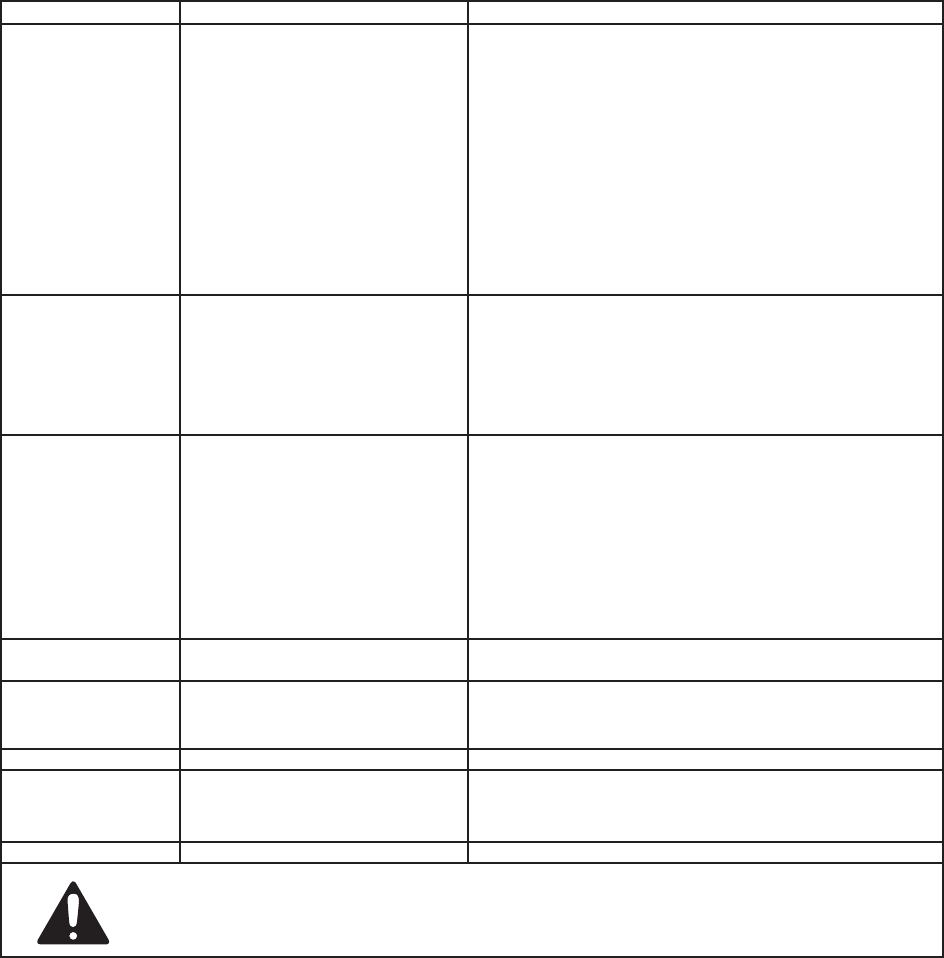
Page 15
For technical questions, please call 1-800-444-3353.
SKU 67501/68740
Problem Possible Causes Likely Solutions
Overheating 1. Filters need cleaning/replacing.
2. Crankcase oil too thin or
incorrect type.
3. Crankcase oil level too low.
4. Unusually dusty environment.
5. Cord is too small of a gauge or
too long to handle compressor.
6. Unit not on level surface.
1. Check inlet and outlet lters. Clean and/or replace as
needed.
2. Drain oil and rell to proper level with recommended
oil.
3. Add oil to proper level, check for leaks.
4. Clean and/or replace lters more often or move unit to
cleaner environment.
5. Increase cord size or use shorter length extension
cord, or eliminate extension cord. See Recommended
Wire Gauge for Extension Cords in Safety section.
6. Reposition unit on a level surface.
Compressor
starts and stops
excessively
1. Compressor not large enough
for job.
2. Loose ttings.
1. Check if accessory SCFM is met by Compressor. If
Compressor doesn’t reach accessory SCFM, you need
a larger Compressor.
2. Reduce air pressure, then check all ttings with a soap
solution for air leaks and tighten as needed. Do not
overtighten.
Excessive noise 1. Crankcase overlled with oil
or oil is incorrect thickness or
type.
2. Crankcase oil level too low.
3. Loose or damaged belt guard.
4. Loose ttings.
5. Unit not on level surface.
1. Drain oil and rell to proper level with recommended
oil.
2. Add oil to proper level, check for leaks.
3. Replace belt guard.
4. Reduce air pressure, then check all ttings with a soap
solution for air leaks and tighten as needed. Do not
overtighten.
5. Reposition unit on a level surface.
Moisture in
discharge air
Too much moisture in air. Install inline air lter/dryer, and/or relocate to less humid
environment.
Oil in discharge air 1. Crankcase oil too thin or
crankcase overlled with oil.
2. Crankcase vents clogged.
1. Drain oil and rell to proper level with recommended
oil.
2. Clean Crankcase vents.
Safety Valve “pops” Safety valve needs service. Pull on test ring of safety valve. If it still pops, replace.
Air leaks from pump
or ttings
Loose ttings.
Reduce air pressure, then check all ttings with a
soap solution for air leaks and tighten as needed. Do
not overtighten.
Air leaks from tank Defective or rusted tank. Have tank replaced by a qualied technician.
Follow all safety precautions whenever diagnosing or servicing the
compressor. Disconnect power supply before service.


















